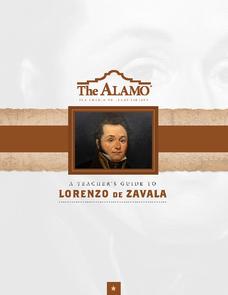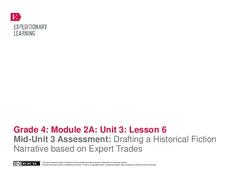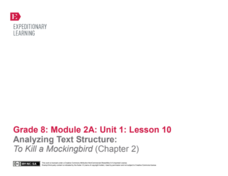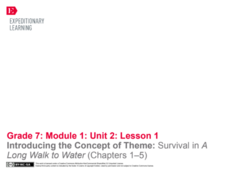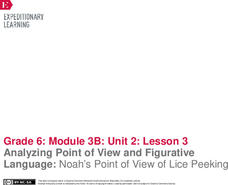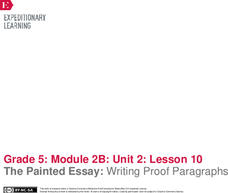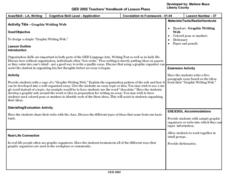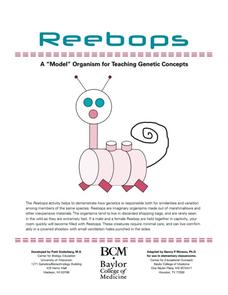iCivics
Argument Wars
From start to finish, here is a fantastic resource that uses engaging activities and an interactive virtual game to teach about major US Supreme Court cases. Your class members will distinguish the primary arguments made in such cases as...
The Alamo
A Teacher’s Guide to Lorenzo De Zavala
Who was Lorenzo de Zavala to the Texas Revolution, and how did he change the Alamo? Find out using an educational resource that asks learners to fill out graphic organizers and respond to short-answer questions to further solidify their...
Austin Independent School District
PERSIA Organizer
Here’s an explanation of the PERSIA Model used in many social studies classes to analyze the influences and infrastructure of an area. Researchers examine the political, economic, religious, social, intellectual, and geographic aspects...
National Geographic
Steps in a Process Diagram
Start at step one with this straightforward graphic organizer! Learners write down five steps in a process to complete the worksheet. Arrows point from one box to the next to show the relationship between steps.
Student Handouts
Before-and-After Chart
Keep track of what happens before and after an event, moment in a story, and so on, with a clear graphic organizer. Learners can note down four things that happen before and four that happen after on this chart.
Do2Learn
Reading Form
Help kids keep track of their reading and comprehend literary texts with a straightforward graphic organizer. Pupils note down the setting and characters as well as four events from the text.
EngageNY
Mid-Unit 3 Assessment: Drafting a Historical Fiction Narrative Based on Expert Trades
Young historians use their planning graphic organizer to prepare a personal narrative draft on expert trades. Since the instructional activity is considered the mid-unit assessment, learners respond to a writing prompt related to the...
Vocabulary A-Z
5-Day Vocabulary Teaching Plan
Reinforce important reading skills with a set of vocabulary lesson plans. Middle schoolers complete sentences, play word games, finish analogies, and build their growing vocabulary with a packet of helpful and applicable graphic organizers.
McGraw Hill
Study Guide for Tuck Everlasting
Tuck Everlasting by Natalie Babbitt is a classic novel that readers have enjoyed for years. Resources within the study guide such as discussion and guided reading questions, extension activities, and graphic organizers aid comprehension...
Newspaper Association of America
Community Connections with Geography and the Newspaper
Understanding geography and government begins at the local level. Using maps and the parts of a newspaper, a unit plan introduces the concept of community. It starts with the creation of classroom and school maps, and then moves through...
Curated OER
Visual Literacy: Using Images to Increase Comprehension
A colorful PowerPoint is a great way to introduce the topic of visual literacy. The eye-catching presentation begins with an overview of visual literacy and then provides some specific strategies to help enhance reading comprehension. As...
EngageNY
Connecting the Universal Refugee Experience of Fleeing and Finding Home to the Title of the Novel Inside Out & Back Again
What does it mean to turn inside out? Using the resource, scholars begin planning their end-of-unit assessment essays. They complete two graphic organizers to form claims about how refugees turn "inside out" and "back again."
EngageNY
Analyzing Text Structure: To Kill a Mockingbird (Chapter 2)
Scholars use the Narrative Structure graphic organizer to analyze the structure of the smaller stories within To Kill a Mockingbird. They talk with a partner to discuss how the structure adds meaning.
EngageNY
End of Unit Assessment: Text to Film Comparison
Scholars work on an end-of-unit assessment to put all of their learning together. They complete short answer questions about gist, multiple choice questions about A Midsummer Night's Dream, and complete graphic organizers comparing film...
EngageNY
Launching the Performance Task: Planning the Two-Voice Poem
Two voices, one poem. Scholars learn about and write a two-voice poem using graphic organizers, model poems, and guides. They practice reading poems with a partner and discuss how a poem of this type could help compare Salva and Nya in A...
EngageNY
Analyzing Point of View and Figurative Language: Noah’s Point of View of Lice Peeking
Read along with me. Two learners read the parts of Noah and Lice in Flush as the rest of the class follows along. Readers look for unfamiliar words and the use of figurative language in the text. They complete graphic organizers and...
EngageNY
Paraphrasing Quotes and Analyzing Visual Elements, Part 4: Investigating the Scientific Method with Max Axiom Super Scientist
Problem solved! Readers continue their work on determining gist and paraphrasing problem-solving steps by reading section four of Investigating the Scientific Method with Max Axiom Super Scientist. Learners complete a graphic organizer...
EngageNY
Building Background Knowledge: The Boy Who Invented TV, “Life before Philo”
Walk through the pictures to understand the text. Scholars analyze The Boy Who Invented TV: The Story of
Philo Farnsworth by taking a book walk and looking at the pictures. They then do a first read of Life before Philo to determine the...
EngageNY
The Painted Essay: Writing Proof Paragraphs
Words of proof. Learners continue coding The Electric Motor by marking the first point in yellow and the second point in blue. They discuss the structure of the paragraphs by identifying transition words and evidence to support the given...
EngageNY
Paraphrasing Quotes and Analyzing Visual Elements, Part 2: Investigating the Scientific Method with Max Axiom Super Scientist
Solve the world's problems. Class members move on to section two of Investigating the Scientific Methods with Max Axiom Super Scientist and complete a similar activity as in the previous lesson. Next, they carry out a first read to...
Curated OER
Graphic Writing Web
Young scholars discuss and develop graphic writing webs, writing supporting ideas for a given topic.
Curated OER
Organs and What They Do - Lecture
Students read information about the internal organs and body systems. In this organs and systems lesson, students read descriptions of the heart, lungs, stomach, small and large intestine, and liver and gall bladder. Students study...
Baylor College
Reebops: A “Model” Organism for Teaching Genetic Concepts
In a sweet simulation, junior geneticists examine the chromosomes of a fictitious Reebop marshmallow animal, combine chromosomes to produce offspring, and then make a model of the resulting Reebop baby. Phenotypes include number of...
Have Fun Teaching
The State of Things
Is it a solid, liquid. or gas? Cut out these graphics for a fun manipulative game that has kids sorting everyday items into their states of matter. They complete three worksheets referencing the sorting activity.
Other popular searches
- Main Idea Graphic Organizers
- Science Graphic Organizers
- Math Graphic Organizers
- Sample Graphic Organizers
- Writing Graphic Organizers
- Graphic Organizers for Math
- Math and Graphic Organizers
- Using Graphic Organizers
- Graphic Organizers Rating=3
- Graphic Organizers for Reading
- Pre Writing Graphic Organizers
- Vocabulary Graphic Organizers



